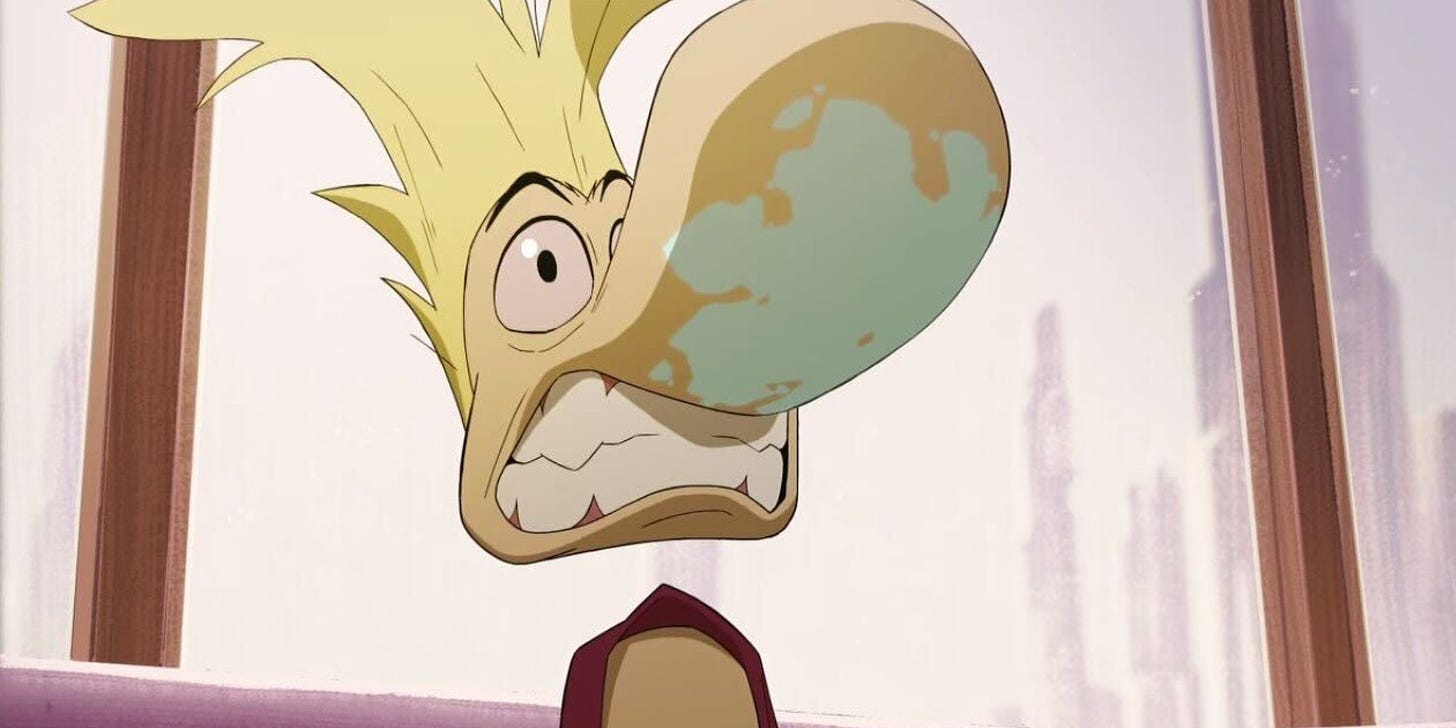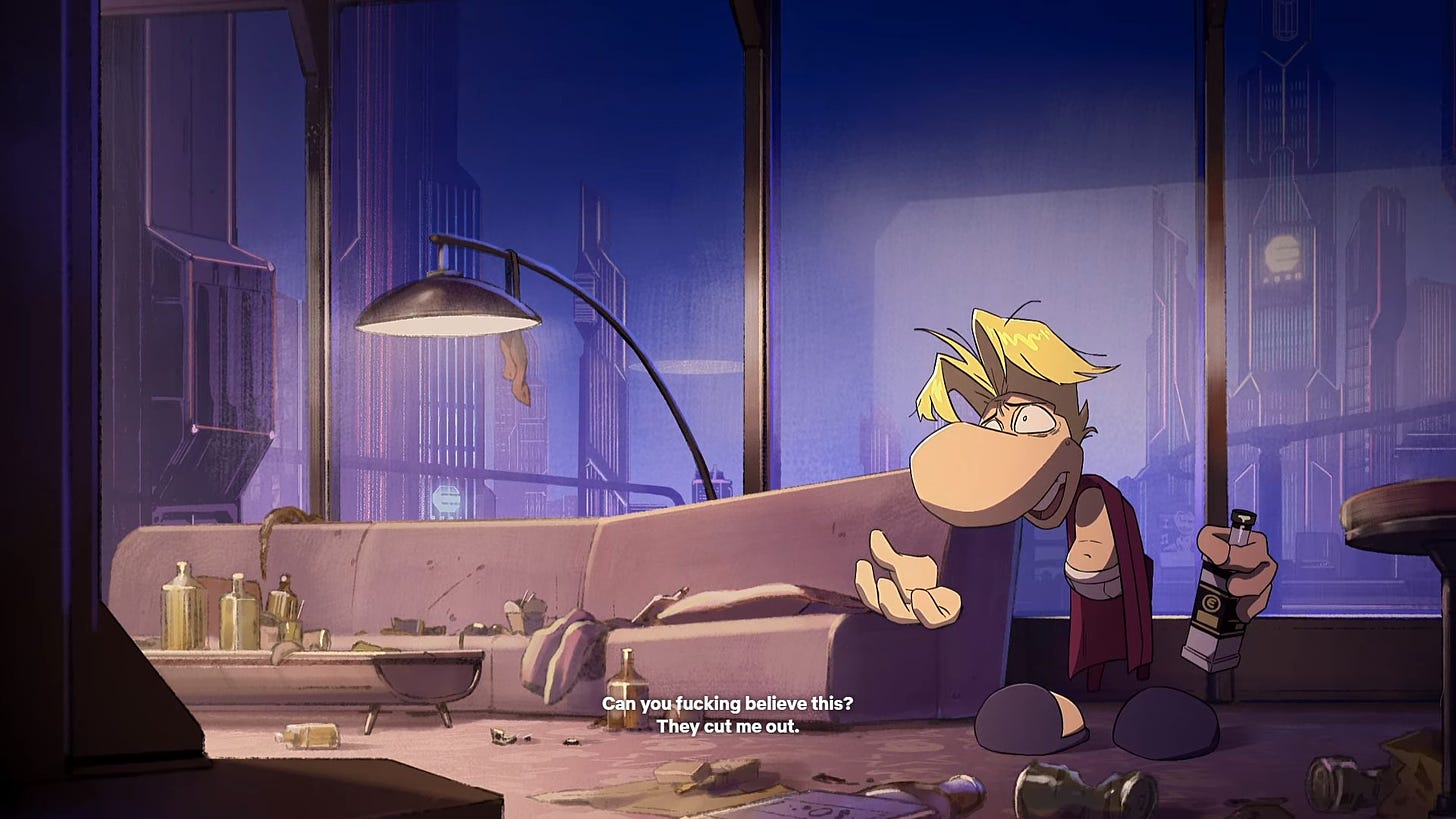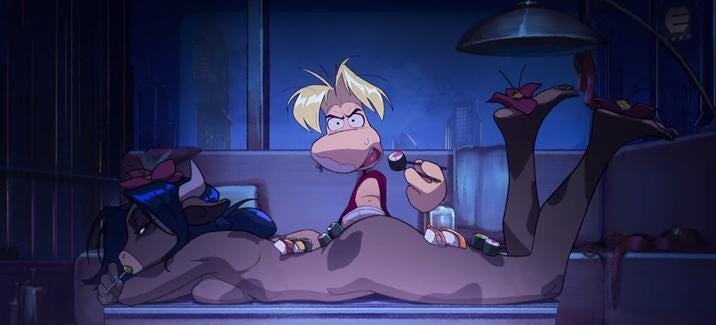I can't stop thinking about Captain Laserhawk's portrayal of Rayman
The iconic Ubisoft character has been transformed from a happy-go-lucky kids character to a deeply sinister, troubled character...and it lives in my head rent free.
First things first: SPOILER WARNING!! I will be discussing parts of Captain Laserhawk: A Blood Dragon Remix’s plot. So if you’re yet to watch it or reach its conclusion, stop reading here.
Captain Laserhawk is barely two minutes old when a state-approved late-night talk show intro tees up the next scene. That the voiceover is so effusive and the jazzy soundtrack underneath is so jaunty almost masks the lead: the show is state-run. It’s propaganda.
Then Rayman jovially jumps onscreen. My face lights up with nostalgia for a moment, then I remember: he’s anchoring a propaganda late-night talk show. It’s the first indication Rayman is not going to be everything we’ve come to know and love him as. He’s the mouthpiece for a fascist dystopia. And he is lauded so much that he has neon signs of his face atop the tallest of buildings in Eden, the country formerly known as the USA.
Reimagining Rayman as this chat show host designed to push state propaganda is perfect. His character up to this point dripped with personality and charisma even if he seldom said a word. He was all big cheesy grins, perfectly-parted blond hair like a golden volcano, and bombastic hand movements. That larger-than-life personality while being relatively mute was part of his charm throughout the Rayman video game series. So dialling that up to 11, fleshing out his character with proper dialogue and running with it - chef’s kiss.
None of it was meaningless, either. In an interview with Polygon, creator Adi Shankar said using Rayman in this way was a commentary on Saturday cartoons that are more akin to 30-minute adverts for the latest toys.
“It’s a commentary on that kind of culture, one that normalises that, ultimately,” Shankar told Polygon “Which is why you have a cartoon character being a spokesperson for [Eden’s] political agenda.”
It’s a shock Ubisoft allowed Shankar to be so wildly creative with its IP, but as he said in a recent interview with IGN, one of the Ubisoft owners would sit in on every meeting to offer support and confirm that Ubisoft was going to allow Shankar to twist its characters in ways we’ve never seen before.
How Shankar and his team build Rayman’s character is shocking, deep, twisted and something that has stayed with me since I finished the series. Shankar told IGN: “I would say maybe I had 7 to 10 images flash into my brain immediately as to what the project is, right? One of them was Rayman with two Tommy guns.”
How we go from late-night talk show host to Rayman with two Tommy guns is a wild ride. Across the six episodes, we witness the downfall of Eden’s mouthpiece and it has stuck with me every day since I finished watching the season.
Halfway through the first season, Rayman is fired from his job for calling a red superhero a “fucking red prick” after the superhero in question calls main protagonist Dolph Laserhawk “interdimensional alien scum”, something which triggers Rayman as he outlines he is a refugee from Dimension X. Even with all the relentless violence and cursing up to that point, hearing Rayman curse, drop the F-bomb, threaten somebody so explicitly, is unnerving.
The next we see of Rayman he’s in his high-rise apartment, wearing nothing but his underwear and a red robe unfastened, swigging from a bottle of whisky. The scene is tense and desperate. There are discarded takeaway containers and empty alcohol bottles strewn across his apartment. The sofa is dirty and the room is lowly lit, an item of clothing is hanging over the lamp. Rayman is clashing with a member of the Board of Directors: “You can’t fire me! I’m the voice of Eden!” he barks at the television before his rage leads him to smash his whisky bottle into the television and break it.
It all feels so sad, like for the first time Rayman is painfully aware that he is an expendable commodity in a world which prizes loyalty to the cause above all else, and those from Dimension X are welcome so long as they tow the fascist, company line. The next we see of Rayman is, in fact back on the television. But before the audience can come up with a theory as to how he made his way back, what deal he did with the Board of Directors to earn their forgiveness, how he sold his soul even more to remain “the voice of Eden”, the audience is shown footage of the original Rayman, *our* Rayman, eating sushi of a half-naked cow lady, with what looks to be a suspicious white powder around his nose - and he is gobsmacked.
The scene is one of the most memorable from the first season - in fact, most of the Rayman scenes are memorable - and it draws us in further to his anger, his life of excess, and his unhinged behaviour.
We’re left to wonder what this all means for Rayman. What depths he will sink to next, now that he has seen he has been replaced by a clone? What is important to stress about this is how none of Rayman’s character feels forced. Which is a surprise. The guy who used his hair as a helicopter and freed millions of Teensies across a plethora of worlds, whose most violent moments came from comically winding up his fist to punch an evil teensy onto the moon, has been transformed into something else entirely - and it fits like a glove.
And perhaps that is because so much of Rayman’s actual character is without context in the video games. His persona is told more through facial expressions and simple actions than anything else, much like other mascots of the 1990s, Crash Badicoot’s suggestive eyebrows before leaping on a hog or Sonic the Hedgehog’s annoying finger wag like he’s been watching Dikembe Mutombo, video game Rayman was just a guy with a big grin, some big hair, and big thumbs up. The rest was yet to be coloured in.
The final two episodes of Captain Laserhawk drive the next chapter of Rayman’s fascinating character arc - but not before he plunges rock bottom. Episode five greets us with the most memorable scene. Rayman snorting coke. If you want to truly make it clear that a once beloved character is now fully off the rails, have them snort coke, first thing in the morning, slumped in front of the television, in their underwear. It’s bleak. Rayman’s fall has been so rapid.
But it spelt the end of his first act as a character in the series and leaves us as the audience excited to see how he develops in season two. What happened on Dimension X that meant he had to flee? How did he become the mouthpiece for Eden’s propaganda? How did the drug problem start?
Rayman marching into the Board of Directors’ office like John Wick, a pair of Tommy guns in hand, and demanding the live execution of Bullfrog be stopped is badass. His final action reminded me of Heath Ledger’s The Joker quote “Gravity is a lot like madness, all it takes is a little push.”
A member of the board asks Rayman if he’s happy now. It’s met with a deranged cackle before Rayman slaughters the entire room. He finally broke. That question was the final push and Rayman descends fully into his madness. He chooses to pursue his own kind of justice. Don’t bet on him saving a Teensy anytime soon.





